
Ukraine will block the Russian social networks VKontakte and Odnoklassniki, as well as the Mail.ru mail service. The websites of Kaspersky Lab and Dr.Web anti-virus companies will also be blocked, as well as access to all Yandex services.
The issue did not pop out all of a sudden: the public has long been asking "how much longer" it is going to be like this, and a proposal to this effect had been submitted to the National Security and Defence Council long ago and generated a discussion there, however no-one believed it would ever be implemented. For example, Zoryan Shkiryak, an adviser to the interior minister, suggested having Odnoklassniki, VKontakte and Mail.ru blocked because, in his opinion, these social networks are controlled by the Russian special forces and are used to channel Russian propaganda. At the same time, Information Policy Minister Yuriy Stets tried to tone down the degree of indignation, saying that the possibility of blocking Russian social networks in Ukraine is ruled out since the issue is not regulated by law. But now this barrier has been overcome.
Critics of the blocking of Russian media traditionally use the "freedom of speech" as a cover and therefore they immediately complained about alleged censorship, fight against dissent and drew comparisons with North Korea (although in North Korea, after such statements, critics would surely be visited by the authorities). Their reasoning, I must say, is rather weak, at least because there is a fine Western alternative to the banned Russian resources.
"Conversations on the topic of censorship in this context, in my opinion, are either a conscientious delusion caused by ignorance, or conscious support for the aggressor state."
— ATR TV deputy director Ayder Muzhdabayev
They also try to look piteous: "I will miss my uploaded music/films/photos", "my grandmother will lose all her contacts of friends she rediscovered on Odnoklassniki" and other reasons connected with habit and comfort.
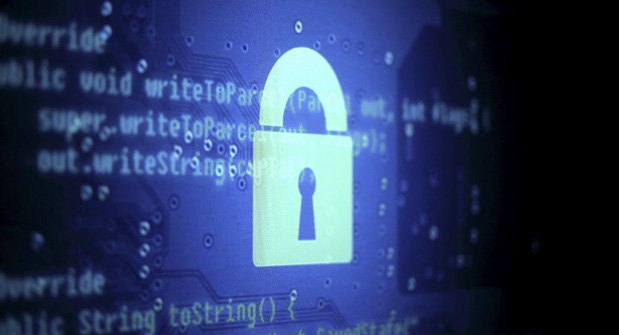
How effective are the bans?
Ukrainians were no less unhappy when Russian TV channels were taken off the air and then when the quotas on Ukrainian-language media content were introduced. But life has already shown that those decisions were correct and did good for both the state and people and even business.
The blocking of Russian media resources is, among other things, a clear indicator of the actions the Ukrainian authorities are planning to take in the future with regard to media in particular and to security in general. It is already clear that law enforcers do not waltz around the organizers of and participants in any new "republics", who block the roads with the help of "dissatisfied pseudo-Hungarians / Poles / Romanians / Bulgarians of Ukraine", the organizers of "[WWII] victory frenzy" and even communist propagandists. Apparently, the view that now is the time for tough measures in the information security sector has won at the top level. For the time being, market participants fully owned by Russia are being cleared off the Ukrainian media domain, and there is a chance that local "collaborators" of the Russian Federation or "revanchists" out of the previous authorities will follow.
A confirmation to this could be an NSDC draft resolution on the "jamming" of signal of anti-Ukrainian TV and radio along the line of contact in Donbas. National Security and Defence Council Secretary Oleksandr Turchynov promised that only Ukrainian radio and TV would be available 30-50 km deep into the rebel-held territory. To achieve this, it is planned to use locally designed data protection systems which can effectively block anti-Ukrainian TV without interfering with Ukrainian TV and radio signal. It is noteworthy that there are plans to extrapolate the Donbas experience later on to the entire Ukrainian-Russian border.
So there is an understanding that it is not enough to only transmit your own signal (by installing more towers) but it is also necessary to block the undesirable signal.
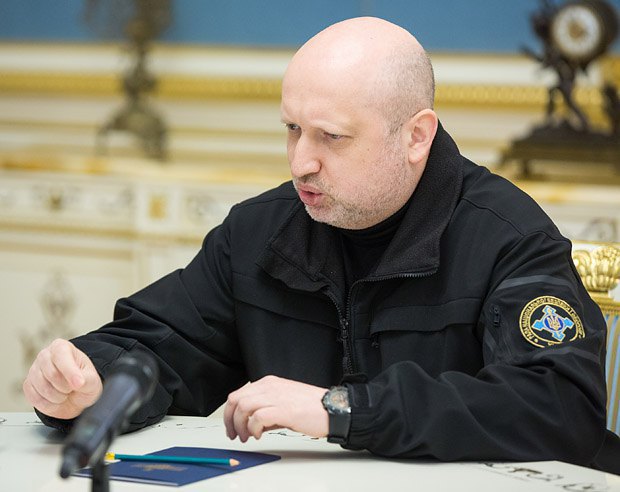
Apparently, this is only a matter of time and resources to tackle pro-Russian and frankly destructive information resources operating in Ukraine. Although, getting ahead of things, one can safely assume that until then, their services will see a notable boost in price to be paid for misinformation by both the Kremlin and Yanukovych's fugitive officials hiding Russia.
By the way, they have already started paying the price after Yandex's shares went 3.3 per cent down at the Moscow stock exchange following the news on the ban on Russian social networks and search engines. We are talking about several million dollars a day. And this is only the beginning: Mail.ru, Odnoklassniki and VKontakte will inevitably slump because they have a huge Ukrainian audience and thus the losses will be sizeable. And how severely will the loss of a market share affect the Russians?
As I have said above, the loss of Russian TV in Ukraine proved effective: content is no longer Moscow-centred, the Russian agenda is no longer popular with the masses and only some zealous viewers continue looking for a possibility to watch their favourite Russian TV soap operas as well as [odious Russian presenters] Dmitriy Kiselev and Vladimir Solovyov. So, regardless of what others used to say, laziness has won.
Social network users are essentially different, not so lazy as TV viewers. And it is naïve to believe that all these users of Odnoklassniki and VK will just come to terms with the loss. These are the most popular social networks in Ukraine: VK's reach is 67 per cent and Odnoklassniki has 48 per cent. Their Western competitors are less popular: Facebook, 42 per cent, and Twitter, not more than 18 per cent. Russian social network users will use any hole to access them, be it anonymizers, VPN and so on (after Russian TV channels were taken off the air, some viewers switched to the Internet or installed satellite dishes).
In any case, the Russian social networks (like the media did earlier) are becoming less popular in Ukraine, with only the staunchest users being likely to stay on. Thus they will lose their significance as misinformation mass media and their role in shaping public opinion will shrink. The practice shows, this is priceless.
It is not an eye-opener that online resources are being used as a tool in Russia's hybrid war against Ukraine, as a tool for collecting Ukrainians' personal data in the interests of Russia, and that they are controlled by the Russian authorities who use it for propaganda and espionage. The only surprising aspect is that the decision was taken three years after the start of the war and not earlier.
There have been tonnes of publications about the destructive role of Russian propaganda. I would like to remind you here about its psychological aspect. In particular, psychologists ran some tests and arrived at the conclusion that it only takes… 45 minutes to zombify an average person. Without much work, the majority can force a minority to believe even clearly delusional statements. This is explained by the fact that a person, first of all, is a social being. And for this quality the person has to pay, giving up "I" and believe the common "We".
How this happens can be seen in the popular sci-fi film, "Me and Others", produced back in 1971 at the Kyiv sci-fi film studio. It describes the basics of manipulating people's consciousness, a number of psychological experiments that demonstrate the ability of people to be exposed to others' thoughts, sometimes to the point of absurdity.

So, the film shows the result of an experiment with black and white pyramids: three participants agreed with the moderator that both pyramids are white. The fourth one was being checked for susceptibility to suggestion. Most of the participants agreed and repeated that both pyramids are white. However, when the person being tested was asked to take the black pyramid, he took the black one although earlier he said that both are white.
A more recent film, "Ordinary Zombies", offers illustrative examples from the Ukrainian-Russian war and is available on the Internet.
According to its authors, any society by default has 10-15 per cent of people who accept the opinion of the majority instantly, without requiring any impact on them. Ten per cent are not prone to zombification. The rest only needs proper time and tools.
"When I said in a post on Odnoklassniki that Russia attacked Ukraine, this wonderful social network banned me at once, without any warning or restore options. What can I say. What is sown, so let it be reaped."
— journalist Arkadiy Babchenko (Russia)
Russian television channels, as well as Vkontakte, Odnoklassniki and other mass media fully controlled by the Russian authorities and special services, are the Kremlin's tools of influence (even more powerful than their tanks and Grads). Earlier, the USSR used "useful idiots" for propaganda purposes, who would sing in their countries about an " ideal socialist society", and even published information bulletins in different languages in foreign countries. Well, sometimes it was lucky to publish a required article somewhere for money.
Now the Kremlin is doing exactly the same thing, except that instead of printed newsletters it launches websites. That is, it maximizes the scope of the audience as no part of society should be left free of ideological influence.
The largest illustrative example is the Sputnik online service available in various foreign languages (by the way, the French version of the website was launched just one year before the French elections), which is run at the expense of the state-run holding company Russia Today managed by notorious propagandist Dmitriy Kiselev. It also includes the Russia Today TV channel and the Voice of Russia radio station. Do you know how this state-run holding company (simply a news agency back then) was called earlier? SovInformBureau.
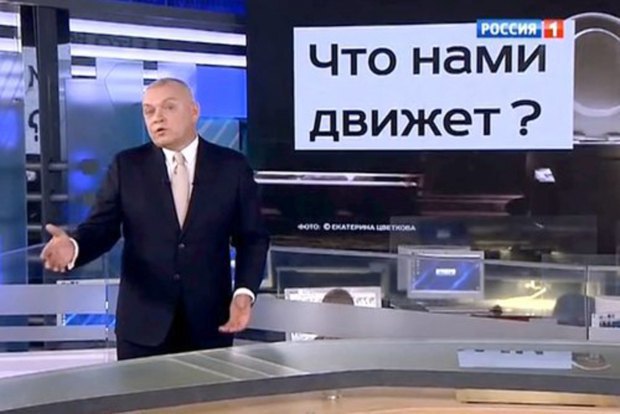
Apart from Sputnik and Russia Today, there are hundreds or thousands of useful media resources which are smaller, less visible, "niche" ones, but no less significant.
"Whereas the Soviet Union waged positional wars, Russia relies on sabotage."
— publicist Pavlo Kazarin (Ukraine)
At the same time, the Kremlin does not need the Western media to necessarily praise Russia, its leadership or ideology. All its propaganda is not so much aimed at advancing its own ideology but at destroying a different one.
"Cynicism and stripping of ideology are the two main export goods of modern Russia. Its foreign media projects are designed to oppose the West. Blur the facts. Substitute reality. They sow the certainty that ’there is no truth anywhere’ and ’everyone is the same’. The moon is round. The moon is flat. The moon is made of Swiss cheese. The moon is an invention of the Masons. Options are offered by hundreds and each of them pushes the truth to the side of the road.’White noise’ disorients and demoralizes. To look cleaner, it is enough to soil a neighbor," Pavel Kazarin writes.
According to him, Russia does not offer a counter-concept, but inundates the media domain with a variety of options designed to bury a fact. "Its task is not to convince everyone of its rightness, but to make them doubt the rightness of the opponent. Whereas the Soviet Union waged positional wars, Russia relies on sabotage," the media expert believes.
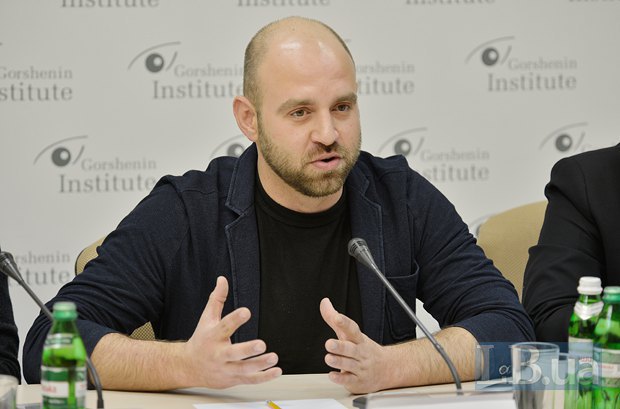
So enough with illusions, do not be naive - Moscow's methods have not changed, it has only "modernized" its tools.
Strength and weakness of Russian propaganda
The power of propaganda is in its massiveness, when most media resources repeat the same thing over a long period of time. In Russia, the Kremlin has resources for this and individual approach to each of them.
If some Dugin-Zatulin-Prokhanov-Frolov says that Ukrainians are “fascists”, this is not the biggest problem as they have been saying this for a long time now. But previously they were considered marginals. So when did people start trusting them? They did when the same allegations appeared not on one or two marginal websites but in the majority of mass media which have huge audiences (Channel One, NTV, Russia and so on). Thus, the regular agenda was replaced with myths about “fascists” and “banderites”. And since human brain cannot compete with a bright, content-packed and dynamic TV picture, TV viewers appeared to have the staunchest anti-Ukraine and anti-West views.
Clearly, this media trick could not have been implemented without the involvement of the Russian state which controls all mainstream media. Therefore the Russian authorities are directly responsible for the propaganda which resulted in the war, deaths and destruction.
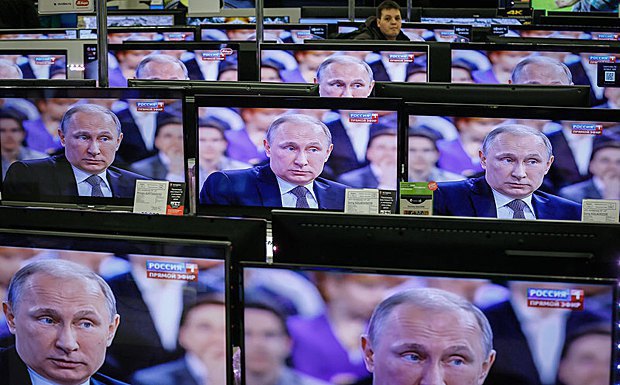
But this strength is also its weakness.
Might is right. Unless there is other might.
Can this disinformation storm can be countered by exposing every lie one by one? Especially considering that propaganda is not always about lies. Often it can be based on partial truth taken out of the context and reaccentuated (think about singer Oleh Skrypka’s statement about “the Russian-language ghetto”). It is craftily cooked and, what is important, shared, you can mend the situation afterwards but the unpleasant taste will linger.
Pin-point response to certain media campaigns is unlikely to work, no human or material resources will be enough for this.
So what should be done about it? The main algorithm of counteraction to Russian propaganda consists of two parts:
First, produce and widely share alternative information products (to squeeze out harmful content).
Second, block hostile content.
Initially, Ukraine and the international community relied on the first type of action, there is freedom of speech after all. For example, the EU set up the East StratCom Task Force, an expert team formed by the European External Action Service in April 2015, to address Russia’s disinformation campaigns, expose lies and inform EU government agencies accordingly. The StopFake portal was launched for the broad audience, some Ukrainian TV channels launched counter-propaganda shows like Vesti UA, Secret Front, Anti-Zombie and others. An alternative TV channel called Nastoyashcheye Vremya, based on Radio Liberty, was established specifically for the Russian-speaking audience.
As for the second type of action, apart from Ukraine, only few countries (Latvia, Lithuania, Estonia and Moldova) dared to impose restrictive measures because Moscow’s actions there were especially bold. However even this decision is not systemic as it only concerns some “most distinctive” media (mostly Rossiya 24). There were also attempts to block Russia Today in Great Britain but they did not affect its broadcasting.
To explain their lack of action, Western politicians and experts use the same argument on the need to respect the “freedom of speech”. None of them has lost a foot of their territory as a result of the Russian aggression, neither they have dozens of thousands of victims and people continuing to die on the front line, which is the case in Ukraine. Moralising is appropriate here.

However, the openly destructive role of Russian mass media forces even some of the most staunchest supporters of the freedom of speech in the West to take more radical measures. For example, by denying accreditation (as it happened during the French election). Or by opening criminal cases against Russian journalists, the way it happened in Germany after the fake story about “girl Liza” allegedly raped by migrants.
Half-measures will clearly not settle the problem of spreading RUssian disinformation. The biggest effect can be achieved if all efforts are combined only.
The most important word in the very notion of Russia’s “information war” against Ukraine is “war”. And the adjective "information" only describes it, answering the question "what kind of". In this war, just like in any war, there is an attacker and there is a defending side. Since Kyiv uses prohibitive measures on its territory, its actions can be qualified as "active defence" only. Not to accept this means to knowingly question the right of the state to self-defence.
Therefore, Kyiv expects, if not the full support of the West (which is impossibly by default as Human Rights Watch, for example, has already complained about a “terrible blow to freedom of expression”), then at least its understanding and tacit agreement, something like "you cannot help our fight against Russia, so at least do not interfere".
One important positive signal has already been received. NATO has supported Ukraine’s decision, saying it is a matter of security, not the freedom of speech.
We can confidently say that even if Ukraine may slide down some global ratings of the freedom of speech, the West will closely observe the effect of the ban on Russian social networks and media. Other countries are most likely to follow Ukraine’s example. Which will provide yet another proof that Ukraine is on the main line of defence.








